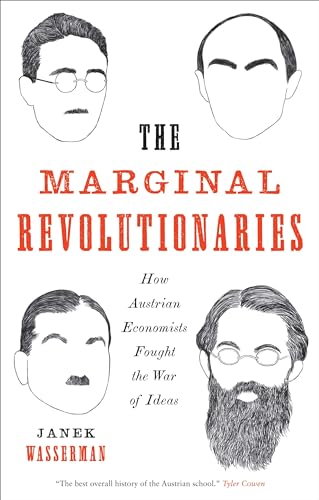The Marginal Revolutionaries
How Austrian Economists Fought the War of Ideas
Janek Wasserman
BOOK REVIEW

In the dynamic landscape of economic thought, there lurks a captivating narrative that intertwines the lives and ideas of brilliant minds whose legacies continue to resonate profoundly in today's discussions of capitalism and freedom. The Marginal Revolutionaries: How Austrian Economists Fought the War of Ideas by Janek Wasserman is not merely a recount of economic theories; it is a vivid tapestry of intellectual conflict, passion, and the indomitable spirit of innovation. Here, Wasserman unearths the riveting tales of Austrian economists - figures who stood defiantly against the prevailing winds of their time, fighting not just for their ideas, but for the very soul of economic freedom.
Wasserman leads us through the tumultuous backdrop of the early 20th century, a period ravaged by two World Wars, economic crises, and ideological upheaval. It was amidst this chaos that the Austrian School emerged, redefining the rules of engagement in the intellectual battlefields of economics. With luminaries like Mises, Hayek, and Rothbard at the forefront, their fight for marginalism became a rallying cry against collectivism, a fight that resonates deeply as we grapple with today's socio-economic challenges.
The author's exquisite prose pulls you into the intensity of these debates, making you feel the exhilaration of groundbreaking ideas clashing head-on with established norms. Wasserman's exploration is not just academic; it's a passionate case for understanding how these economic warriors paved the way for a rethinking of freedom and individualism, thus heightening the stakes of their intellectual battles. It compels you to consider how their insights have shaped, and continue to shape, modern capitalism. Every page is filled with fervor, igniting a blend of admiration and respect for these oft-overlooked giants of economic theory.
Yet, opinions about this work are as varied as the ideas it discusses. Some readers celebrate Wasserman's ability to breathe life into the austere field of economics, heralding his storytelling prowess. They argue that he makes the complex interactions of theory and historical context accessible, leaving no stone unturned in his quest for clarity. Others, however, voice criticism, questioning whether his enthusiasm occasionally veers into the territory of oversimplification. Does he romanticize the Austrian perspective to an extent that it overshadows valid criticisms of the ideology? Such discussions indicate the provocative nature of Wasserman's narrative - one that challenges you to think, question, and engage deeply with the material.
What are the implications of this "war of ideas," as Wasserman frames it? Have the Austrians succeeded in their mission? Today, their concepts of individualism and free markets echo not just in economics classrooms but in the halls of policymaking globally. Their legacy influences contemporary discussions around economic freedom, to the point where one might argue that ignoring their contributions could lead to a significant misunderstanding of our current economic dilemmas.
Wasserman's The Marginal Revolutionaries transcends mere biography or economic history; it is an urgent reminder of the power of ideas and the vital role they play in shaping our world. It shakes the reader awake, compelling you to reassess the narratives around economic discourse. As you close the book, you're left with an undeniable urge to explore further, an electric curiosity that urges you not to remain passive but to engage actively with the ideas that affect your life every day.
In a time where skepticism towards institutions is rampant, understanding the context and evolution of these ideas becomes essential. The intellectual legacy of the Austrian School is a thought-provoking journey that ripples through the decades, asserting a powerful argument for individual choice and market dynamics that demands your attention. Dive into Wasserman's narrative and allow it to awaken your understanding of the forces that shape our society. Feel the revolution tug at your intellectual curiosity, compelling you to not only unearth knowledge but to actively partake in the ongoing war of ideas. 📈🌍
📖 The Marginal Revolutionaries: How Austrian Economists Fought the War of Ideas
✍ by Janek Wasserman
🧾 368 pages
2020
#marginal #revolutionaries #austrian #economists #fought #ideas #janek #wasserman #JanekWasserman